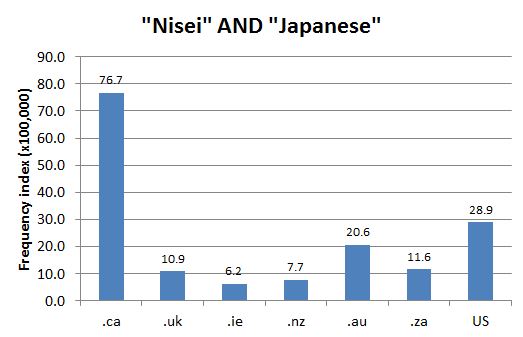DCHP-2
Nisei nisei, nissei DCHP-2 (October 2016)
n. & adj. — Ethnicities
a Canadian whose parents are Japanese.
Type: 4. Culturally Significant — Nisei is a lexical transfer from Japanese "nisei", meaning second generation. The term appears to have been first used in English in the US, and is used in many locations to refer to persons of Japanese descent living in the Americas (see OED-3, s.v. "nisei"). In Canada, the term has acquired cultural significance due to the history of Canadians of Japanese descent in Canada. In 1942, shortly after the Japanese attack on Pearl Harbor, the Canadian government used the War Measures Act to forcibly remove all Japanese persons and Canadians of Japanese descent living within 160 km of the Pacific Coast. Thousands of people were placed in internment camps, while the Canadian government sold their personal property, including homes and boats.
Canadians of Japanese descent then faced discrimination and deportation after the war. Groups fought for redress and compensation and in 1988 the Canadian government acknowledged wartime wrongdoing and began to provide compensation for those who were interned and whose property was sold by the government (see Canadian Encylopedia reference).
Many of those interned were Nisei - in fact 75% of internees held Canadian citizenship. Many Nisei attempted to enlist in the Canadian military, but almost all were denied entry into service (see Canadian Encyclopedia reference). The experience of the Nisei engendered debates about the relationship between citizenship and ethnicity, as the Canadian government believed Nisei might feel loyalty to Japan rather than to Canada due to their ethnicity (see, e.g. the 1983 quotation).
Nisei is most prevalent in Canada (see Chart 1), although alternate spellings exist in other locations, making frequency more challenging to ascertain.
COD-2 marks the term as "N Amer.", of which Chart 1 shows the Canadian dimension in terms of frequency, apart from cultural significance for the country, especially the West.See also: War Measures Act
References:
- COD-2
- Canadian Encyclopedia s.v. "Japanese Canadians" Accessed 6 May 2016
- OED-3
Images:
Chart 1: Internet Domain Search, 2 Jul. 2013
